Many countertops and under-sink water filters are so expensive that homeowners may pass on buying them.
Luckily, you don’t have to break the bank to drink clean water. A water pitcher is a cost-effective solution for every household.

This article will analyze the two main water pitcher brands, Zero Water vs. Brita.
We will show you the main similarities and differences between the two systems, what filters they use, and what contaminants they get rid of. We are also going to tell you which is our favorite and why.
Zero Water vs Brita |
|||
|---|---|---|---|
ZeroWater ZP-010, 10 Cup Water Filter Pitcher |
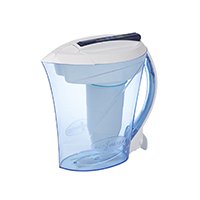
Zero Water Filter |
|
View Latest Price |
Brita Standard Everyday Water 10 Cup Filter Pitcher |
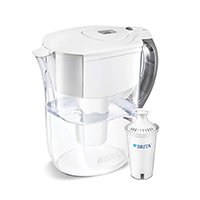
Brita Water Pitcher Filter |
|
View Latest Price |
Zero Water Overview
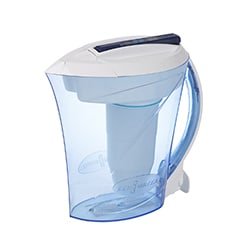
Zero Water is one of the leading brands in the world of countertop water filters. The company manufactures a range of water pitchers with a capacity of between six and 40 cups. Thanks to their advanced filtration system, these products are ideal for use at home, work, or even in an RV.
The list of features and certifications that set it apart makes Zero Water different from any other pitcher filter. Not only are these filters premium quality, but they are also afforded a feature most users praise.
According to the manufacturer, Zero Water filters remove up to 99.6% of all dissolved solids in water, which stand up to their claim.
Alongside removing almost all contaminants, these pitchers also come with an NSF certification that Brita lacks. Surprisingly effective, these pitchers come equipped with a patented 5-stage filtration system with ion exchange capabilities.
How Effective Are Zero Water Filters?
Certified by the NSF, the Zero Water systems claim they can remove up to 99.6% of all solid contaminants in water. This includes the most harmful chemicals, dirt, and grime that could find their way into tap water.
The filter can replace a more expensive under-sink filter with similar results thanks to their advanced 5-stage filtration system.
The first layer of the filter consists of coarse filtration components developed to filter out fine particles and sediment. During the second stage, a foam distributor disperses the water evenly across the width of the filter, increasing its efficiency and lifespan.
Then, the water passes through an activated carbon filter that removes organic contaminants and chlorine.
During the last two stages, the water goes through a demineralization process, while the last layer removes even the ultra-fine particles in the water.
All these claims are proved by a TDS meter which is included in the package that you can use to check the filtered water quality.
Brita Overview
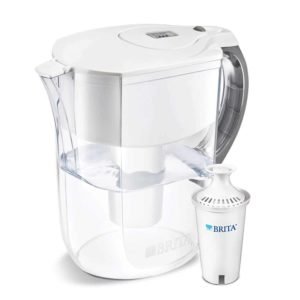
Brita is another one of those brands renowned for its quality products. The company stands in the market with a range of products, including pitchers, water bottles, and faucet filter systems developed to meet the needs of all users and households.
Like Zero Water, Brita functions to a high standard and promises to remove most contaminants in the water. This includes chemicals, heavy metals, dirt, and foul smells and tastes.
All this is possible thanks to the activated carbon filter enhanced by an ion exchange resin that also removes water-hardening minerals.
A big advantage Brita has over Zero Water is the fast filtration process that gets clean water into your glass in less than a minute.
Recommended Reading: PUR vs. Brita: Similarities, Differences and Which is Best?
How Effective Are Brita Filters?
With an NFS certification, Brita filters can effectively remove most water contaminants. The manufacturer does not give you a percentage, though. We know that Brita filters can successfully remove harmful chemicals, organic matter, and heavy metals, including lead and mercury.
You will get clean water quickly and easily with the ultra-fast filtration rate.
Zero Water vs. Brita Comparison Chart
| Zero Water ZP-010 | Brita Standard Everyday Water | |
| TDS | 445 ppm | 147 ppm |
| Tank capacity | 10 cups | 10 cups |
| Filter speed/quart | 6 minutes | 4 minutes |
| Taste test | 94% | 65% |
| Filter lifespan | 40 gallons | 40 gallons |
| Price | $$ | $ |
Design
Zero Water ZP-010 and Brita Standard Everyday Water pitchers have the same capacity, but significant design differences exist.


Zero Water ZP-010 measures 12.25 x 6 x 11.63 inches, but it weighs only 1lb when empty. An ergonomic handle makes pouring a cinch regardless of hand size – even kids can pour comfortably. Speaking about kids (and people with hand arthritis), we must also mention that this water filter pitcher has a pouring spout and a spigot. In other words, you can either pour or dispense water in your glass, depending on what’s more manageable.
Another highlight is the covered pouring sprout. This design ensures no impurities will fall in your filtered water.
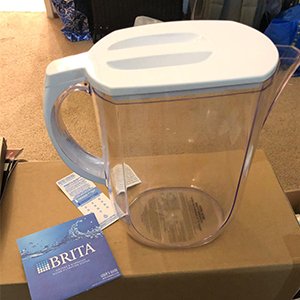
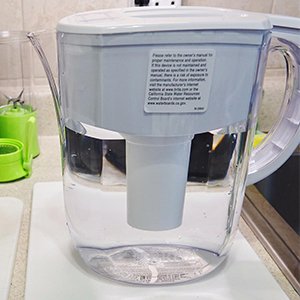
Brita Standard Everyday Water has a standard pitcher design – no spigot on this one. The pitcher measures 5.4 x 10.7 x 10.1 inches but is heavier than Zero Water despite its more compact dimensions. A pro, however, is that it fits easily on most fridge doors.
Handling this pitcher when full requires some elbow grease. Overall, though, it’s what you’d expect from a filter pitcher.
A critical design difference is that Brita features an electronic filter indicator, whereas Zero Water does not. To compensate, Zero Water comes with a TDS water quality meter you can use to test the number of impurities removed.
We prefer Brita’s electronic filter indicator, but Zero Water is for you if you want more thorough monitoring of the filtration process.
Features
How Do Zero Water and Brita Clean Water?
Zero Water and Brita Standard Everyday similarly clean water, but Zero Water removes more contaminants. The main difference is the 5-stage filtration system Zero Water employs. Zero Water filters use activated carbon, ion exchange technology, and mechanical filtration to reduce contaminants.
Range of Contaminants Removed
Both Brita and Zero Water use NFS-certified filters. Brita uses an activated carbon filter to reduce chlorine from municipal water supplies and improve tap water taste. The filter also reduces odors, while mechanical filtration removes impurities. Brita’s standard filter also traps certain heavy metals, including mercury, but it doesn’t remove lead.
Recommended Reading: Aquagear Water Filter Pitcher Review: (Tested To NSF Standards)
Zero Water uses a 5-stage filter developed to remove over 99% of total dissolved solids. The filter removes lead, other heavy metals, chlorine, chemicals, and impurities. Thanks to its ion-exchange technology, the Zero Water filter pitcher is an excellent choice for those using well water or in areas with hard water. Brita is a more affordable option for those mainly using a municipal water supply.
Contaminants removed at a glance:
| Zero Water ZP-010 | Brita Standard Everyday Water |
| Chlorine, taste and odor, Lead, Other heavy metals, arsenic, Pesticides, and herbicides, Chloramines, Bacteria, Particulate | Chlorine, taste and odor, Mercury, Cadmium, Copper, Zinc, Particulate |
Minerals
Water contaminants are a nuisance, but the vital liquid contains nutrients you might not want to remove. These nutrients include magnesium, sodium, and calcium – minerals necessary for the proper functioning of our bodies.
Brita water filter pitcher doesn’t remove them. Most people benefit from these healthy minerals. However, sodium in water might be a concern if you’re on a low sodium diet. If that’s the case, Zero Water might be a better choice for you.
Designed to remove virtually all TDS in tap water, Zero Water removes sodium, calcium, and magnesium, too.
Zero Water vs. Brita Filtration Speed
Zero Water ZP-010 and Brita Standard Everyday have similar filtration speeds, but Brita wins this round. The Standard Everyday filter can clean a quart of water in four minutes. Zero Water requires two extra minutes for filtering the same quantity.
Sure, Zero Water removes more contaminants, and the wait might be worthwhile if your water source might be contaminated or if you live in an older building and are concerned about lead in the water.
Our Test Reports
Both Zero Water and Brita Standard Everyday water filter pitchers lived up to expectations. Brita is a guarantee in itself. The brand has been around for decades and performs brilliantly. We like that it doesn’t filter out healthy minerals and that it filters water relatively fast.
Zero Water is much younger than Brita, but the brand manages to impress. This water filter pitcher removes most contaminants, but it also removes minerals. You might want to go for it, though, especially if you’re on a low-sodium diet.
Another thing that we like is Brita’s electronic filter indicator. It doesn’t show you the exact amount of total dissolved solids but lets you know when to change the cartridge. If you have a busy lifestyle and don’t want to test your water, this system is more convenient.
On the other hand, if you’re a control freak and want to know just how clean your water is, you might want to opt for Zero Water.
Dispensers
If you’d rather use a dispenser instead of a water filter pitcher, you’ll be glad to know that Zero Water merged the styles and allows you to pour and dispense water from the same container. The spigot is located under the handle and is easy to use by kids and people with disabilities.
Brita water pitcher doesn’t have a dispenser function, but if you have a bigger family and would rather buy a dispenser, you can opt for the brand’s Standard dispenser instead.
The dispenser uses the same Standard filter found in the Standard Everyday water pitcher but has a capacity of 18 cups and a precision pour spigot.
If you like Zero Water but need a higher-capacity water filter pitcher, know that this brand also manufactures a countertop dispenser with a capacity of 18 cups. Brita’s dispenser is more affordable than the pitcher, but the Zero Water dispenser filters more impurities.
Cartridges
If you’ve bought a water filter pitcher, you probably have questions like: “How long do Brita filters last?” or “How often to change Brita filters?”
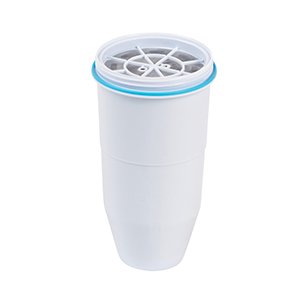

We’re going to answer those questions but must first say that Zero Water and Brita use similar cartridges. They both have a lifespan of around 40 gallons. However, because Zero Water filters more impurities, you might have to change those cartridges faster than expected.
The actual lifespan of your filters depends on the number of impurities in your tap water. Some may have to change the filter after merely two weeks, while others will be able to use the same cartridge for up to two months.
Size
Brita Standard Everyday and Zero Water have a similar size and the same 10-cup capacity. However, Brita is a bit smaller than Zero Water regarding actual dimensions. Its narrower design makes it easier to fit on a fridge door.
Zero Water is slightly larger but lighter and easier to handle. We recommend Zero Water if low weight and mobility are essential to you. Brita is an excellent choice if you have a smaller fridge and want to ensure your water filter pitcher fits on a door shelf.
Cost
Table could not be displayed.Brita has made a name for itself in the water filter industry thanks to the cheap water filter pitchers they manufacture.
And things are no different when comparing Zero Water vs. Brita. Although Brita has been around for much longer, they are still the industry leader in affordability.
Not only is Brita Standard Everyday cheaper than Zero Water, but the filters last longer and aren’t as expensive to replace.
That said, both water filter pitchers are affordable. If you’re concerned about lead or other water contaminants, rest assured you won’t have to spend an arm and a leg to get Zero Water.
User Review and Complaints
There seems to be a generally positive consensus regarding the Zero Water filter pitcher. Users appreciate the built-in spigot that turns the pitcher into a dispenser. Lighter than Brita, users also deem it a better choice for van life or camping.
The main complaint regarding the Zero Water filter pitcher is the short filter lifespan. Although it is advertised to filter up to 40 gallons, you’ll rarely get that capacity out of it.
People even claimed they had to change the filter after merely two weeks. Thus, the Zero Water filter replacement is costly.
Perhaps the biggest downside, according to the Zero Water reviews, is that the pitcher releases most contaminants back into the water when the filter clogs. For this reason, you should use the TDS meter daily to make sure the water is clean before drinking.
Brita doesn’t come with Zero Water’s claims. This water filter pitcher has been around for decades and does exactly what it says – it removes chlorine and improves water taste. Although it also removes other contaminants, the filters last for quite some time.
Users are generally happy with the filter lifespan and the pitcher design. Some don’t like that the sprout isn’t covered, and a handful of users may find it awkward or uncomfortable to handle the pitcher. All in all, though, there are a few complaints about this filter.
Our Overall Test Report
Zero Water and Brita Standard Everyday may look alike, but they are very different. Zero Water does an excellent job removing total dissolved solids from water and other impurities. The water filtered with Zero Water is palatable and has no detectable odor.
The filter doesn’t last for as long as advertised, but the water purity meter included in the pack shows it’s completely free of impurities. If you have well water or are concerned about lead contamination, this is undeniably the right water filter pitcher for you.
Brita may not remove as many contaminants as Zero Water, but we like the taste of water filtered with this pitcher better. The main difference between Zero Water and Brita is that the latter leaves all healthy minerals right where they belong, giving the water a thirst-quenching sapidity.
ZERO VS BRITA : Related Questions
Does Brita Filter Remove Fluoride?
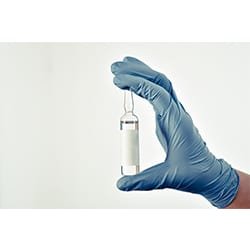
Just like Zero Water, Brita promises to remove most solid contaminants from water.
However, the system only reduces a trace amount of fluoride. This is majorly due to the company’s belief that fluoride in water can help fight tooth decay with sodium fluoride.
While this claim is valid, it is also true that excess fluoride can cause a series of diseases, including debilitating bone disease, kidney issues, cognitive impairment, hyperthyroidism, osteoporosis, cancer, and even depression.
Since it is hard to assume how much water with fluorine a person drinks per day and fluoride is present in toothpaste and other oral hygiene products, scientists believe that drinking water without fluoride is the best way to prevent all associated health issues.
Brita Filter Problems
The filter’s main problem is the low capacity to remove fluoride from tap water. While this is not a flaw but a conscious design choice, most people might prefer a pitcher that can remove fluoride too.
Another slight drawback is the lifespan of the filter. Brita filters last about 40 gallons of water, roughly two months. This could turn into a pretty expensive countertop water filter system if you drink plenty of water or want to purify cooking water.
The filter indicators are also far from accurate. However, it should be quite easy to keep track of your filter’s life and when to change it, by noting down the gallons of water you filtered or the date you installed it.
Another slight design flaw is that the filters are prone to spilling. You should be careful when pouring water from the pitcher to your glass, or you could waste precious clean water.
Is Brita Healthy?
Just like Zero Water, Brita comes with all BPA-free components and is safe to use by all family members. If you have kids, there is nothing to worry about them drinking water from this pitcher. The same goes for using filtered water to cook baby food.
Does Zero Water Filter Remove Fluoride?
Zero Water pitchers can remove over 99% of all solid residues in water, which includes fluoride. According to the manufacturer, the pitcher can remove up to 99% of the fluoride in the water alongside a list of other chemicals, heavy metals, and organic contaminants.
Main Zero Water Filter Problems
Zero Water pitchers may be the best in the class, but they are not flawless. Their main problem is slow filtration.
While the wait is well worth considering the results you can get, if you would like to get clean water fast, this is not the right filtration system for you.
Zero Water or Brita: Which Should You Buy?
When choosing between Zero Water and Brita, it’s all down to needs and preferences.
Zero Water | Brita | |
|---|---|---|
| Type of Filter | 5-stage | Carbon |
| Filter Lifespan | 2-4 months | 2-4 months |
| Effectiveness | Removes 99.6% of total dissolved solids | Reduces chlorine, copper, and mercury |
| Price per filter | $12-$20 | $10-$30 |
| Pitcher or Bottle | Pitcher and bottle options available | Pitcher and bottle options available |
| Certification | NSF Certified | NSF Certified |
Where do you live, and what is your water source? If you live in a modern urban area and use a treated water supply, Brita is cheaper and does an excellent job improving water taste.
If you live in a rural area and have well water or live in an old building and lead contamination is a concern, go for Zero Water. No matter which you pick, rest assured you and your family will have access to clean, delicious drinking water.
Table could not be displayed.




